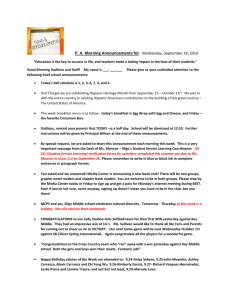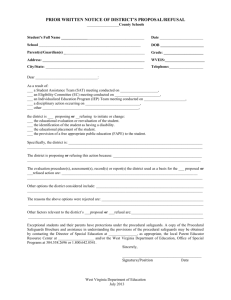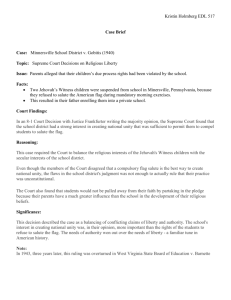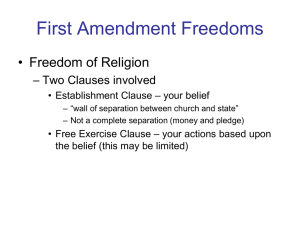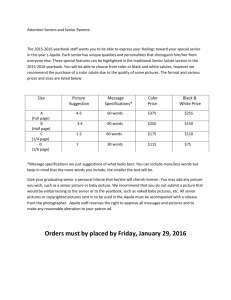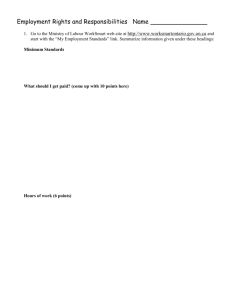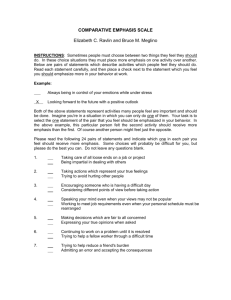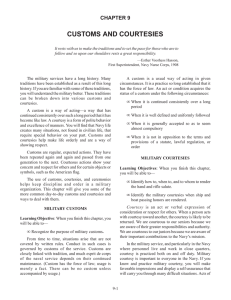Notes- 1st Amendment- Freedom of Religion
advertisement
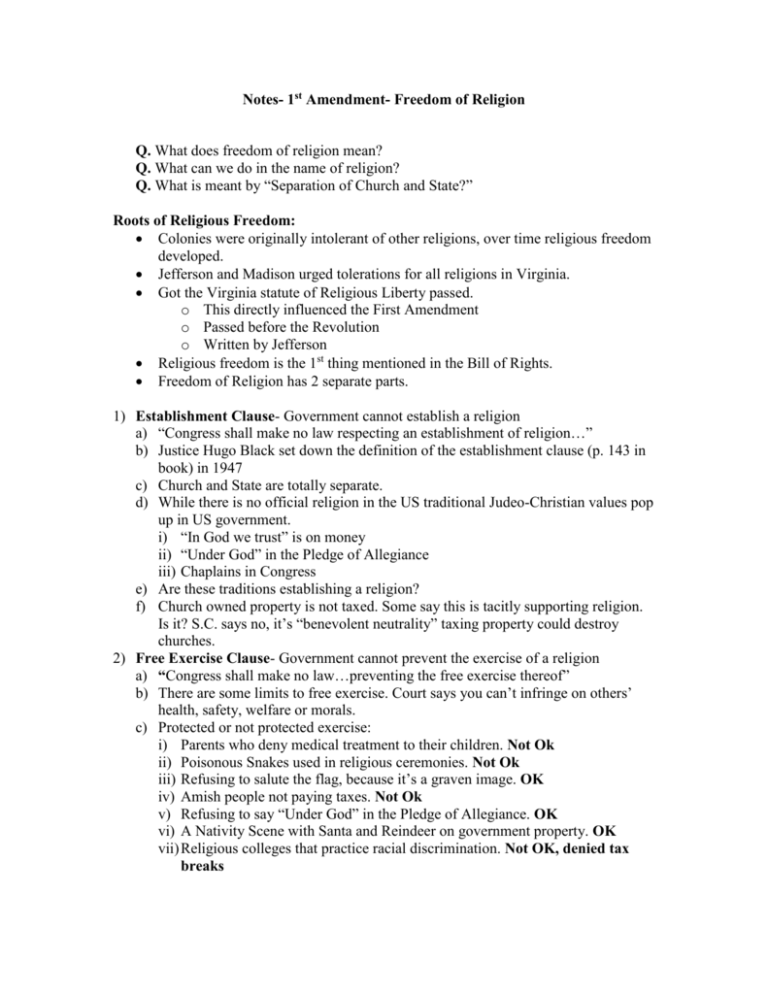
Notes- 1st Amendment- Freedom of Religion Q. What does freedom of religion mean? Q. What can we do in the name of religion? Q. What is meant by “Separation of Church and State?” Roots of Religious Freedom: Colonies were originally intolerant of other religions, over time religious freedom developed. Jefferson and Madison urged tolerations for all religions in Virginia. Got the Virginia statute of Religious Liberty passed. o This directly influenced the First Amendment o Passed before the Revolution o Written by Jefferson Religious freedom is the 1st thing mentioned in the Bill of Rights. Freedom of Religion has 2 separate parts. 1) Establishment Clause- Government cannot establish a religion a) “Congress shall make no law respecting an establishment of religion…” b) Justice Hugo Black set down the definition of the establishment clause (p. 143 in book) in 1947 c) Church and State are totally separate. d) While there is no official religion in the US traditional Judeo-Christian values pop up in US government. i) “In God we trust” is on money ii) “Under God” in the Pledge of Allegiance iii) Chaplains in Congress e) Are these traditions establishing a religion? f) Church owned property is not taxed. Some say this is tacitly supporting religion. Is it? S.C. says no, it’s “benevolent neutrality” taxing property could destroy churches. 2) Free Exercise Clause- Government cannot prevent the exercise of a religion a) “Congress shall make no law…preventing the free exercise thereof” b) There are some limits to free exercise. Court says you can’t infringe on others’ health, safety, welfare or morals. c) Protected or not protected exercise: i) Parents who deny medical treatment to their children. Not Ok ii) Poisonous Snakes used in religious ceremonies. Not Ok iii) Refusing to salute the flag, because it’s a graven image. OK iv) Amish people not paying taxes. Not Ok v) Refusing to say “Under God” in the Pledge of Allegiance. OK vi) A Nativity Scene with Santa and Reindeer on government property. OK vii) Religious colleges that practice racial discrimination. Not OK, denied tax breaks 3) Religion in Schools a) Government aid to Parochial Schools i) Can provide aid to benefit children if it’s not aiding religion, like free lunches, medical care, and secular textbooks. ii) Avoid “excessive entanglement” with religion. Can’t give anything that could be used to teach religion. b) Religious instruction in public schools i) No “released time” religious education. Schools can’t have even optional religious classes on school grounds, off campus is ok. ii) Religious groups can hold meeting on school grounds, outside of school hours. iii) No prayer in school, ever. iv) In response groups have proposed a constitutional amendment to allow for voluntary school prayer c) Can’t read the Bible, without comment in school. d) Bible can be read and studied as literature or history, as well as all other religious texts. e) Cannot teach the Biblical creation story instead of evolution. f) Can have a Moment of Silence, but not one designated for prayer. 1) Government intervention in church affairs U.S. v. Ballard (1944) -Uses mail to get money for church -Claims to heal people -S.C. says yes, they can sell faith 2) Exercise of Religion West Virginia State Board of Education v. Barnette(1943) - Must salute flag - Jehovah’s Witness says no - S.C. says no, you don’t have to salute Hamilton v. Regents of U of Cali.(1934) - Conscientious objector - Forced traveling and schooling in regards to the military - Methodist kids refuse - S.C. says the rule is ok. U.S. v. Seeger (1965) - Believe in a “Divine Being” and those beliefs don’t allow you to participate, thus you don’t have to. - Does discriminate between beliefs - Looking to expand the law into just morals and not religion - S.C. said fine, not just “Divine Being” religions- still have to fight not yet based on ethics Gillette v. U.S. (1971) - Refusing to fight in a particular war and not just war in general - Refused based on Humanist Philosophy - S.C. says they cannot object for particular wars 3) Religion and the Right to Work Sherbert v. Verner (1963) - Refused to work on Saturdays. - She was fined - Sued because she was not free to exercise her religion - S.C. cannot fine her. 4) Public Education Wisconsin v. Yoder (1972) - Amish/ Years in school. - Took kids out after 8th grade. - Tried and convicted –appealed - Wise. S.C. said the laws violated their right to practice their religion Lambs chapel v. center moridus union Free School District (1993) - Can public schools be used for religious groups after school - NY appeals and district upheld the law which said, “No religious after school activities.”
